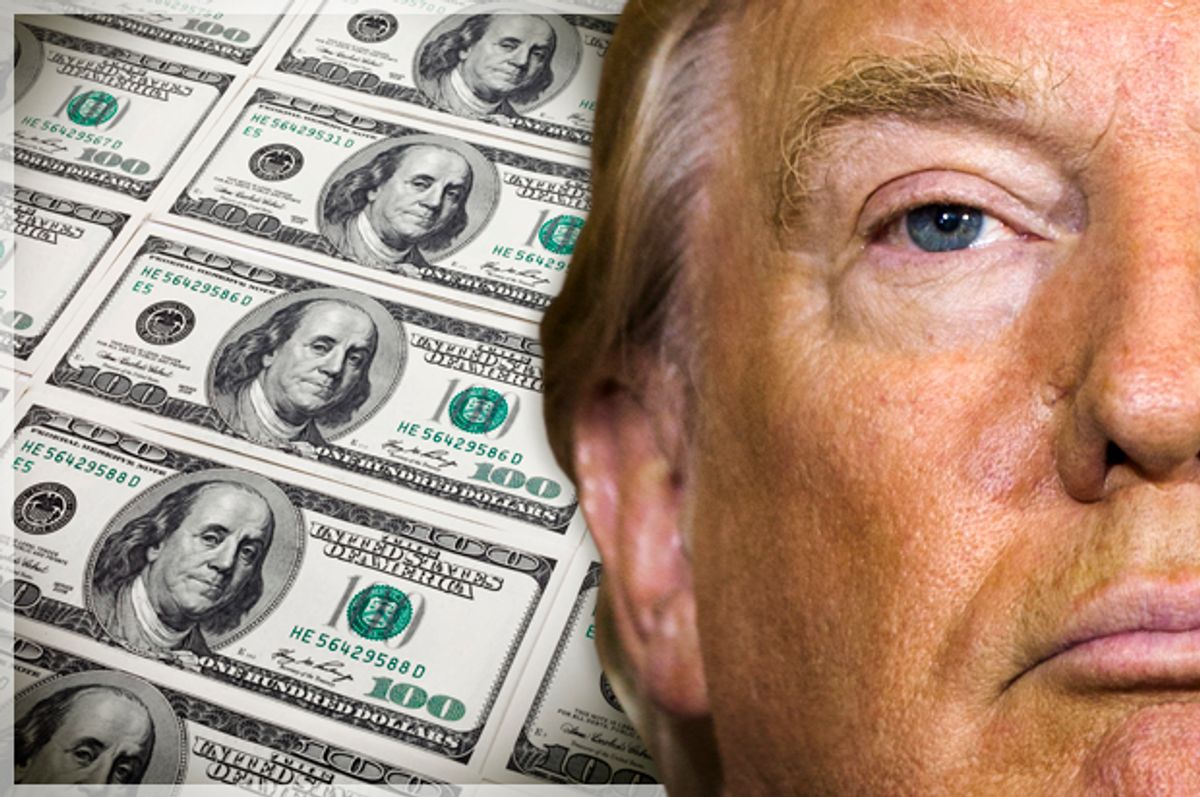With President-elect Donald Trump's ever-present conflicts of interest causing even the conservative government watchdog group Judicial Watch to protest, his transition team is reportedly now considering a half-measure solution meant to shirk scrutiny while allowing Trump to keep watch of his fortune from the Oval Office.
Politico reported on Wednesday that after calling off a post-election press conference meant to address how the president-elect's plans to handle his massive private business interests while in office, Trump's transition team has focused its efforts on developing a so-called discretionary trust by which Trump can appear to avoid conflicts of interest without having to actually sell off assets or place wealth in blind trusts, which president-elects traditionally do:
Such an arrangement could allow Trump or his family members to reap some of the legal benefits of a blind trust, but could also give them some insight into how the Trump businesses are faring while also allowing Trump and his family to continue to make money from those investments.
Trump's campaign team had previously said that his three oldest children — Donald Jr., Ivanka and Eric — would control what is labeled a blind trust for the president-elect to deal with the ethical quandary presented by his business dealings. But after all three children came under widespread criticism for partaking in transition meetings, Trump announced that Ivanka would work with his incoming administration while his two sons will manage the blind trust and Trump Organization. Politico explained how Trump's transition team's new plan for a "half-blind" trust differs from a traditional blind trust:
In a typical blind trust arrangement approved by federal ethics authorities, an incoming official’s investments are transferred to an institutional financial manager who oversees them without reporting details to the owner. Assets that risk a conflict of interest are sold off over time and replaced with assets the official is not informed about.
Even with a blind trust, the conflicts are not considered resolved until the original problem-creating assets are sold off.
But with a discretionary trust, the conflicts almost magically disappear because the investments aren’t considered to belong to the incoming official at all — even if they’re producing a steady stream of income for the official. Instead, the assets are held in a trust that is often overseen by a family member who can, but is not legally required to, send revenues from the assets to the government official. Another benefit: there’s no explicit prohibition on the official talking with the trustee about the financial holdings.
Trump aides have discussed the idea of discretionary trusts with the Office of Government Ethics (OGE), according to Politico, which cited two unidentified sources briefed on the talks. Trump spokeswoman Hope Hicks said decisions have not yet been finalized.
Politico's report — along with new reports this week that Trump's sons were involved in plans to sell access to the Trump administration for million-dollar donations during the inauguration and that Trump Organization officials have pressured foreign diplomats to use the facilities at Trump's new Washington, D.C. hotel — indicate that despite his half-baked measures, Trump isn't too concerned by the appearance of any conflicts interest.
A recent Pew Research survey found, however, that 65 percent of Americans reported they were very or somewhat concerned about Trump's potential conflicts. Perhaps that's why top Trump ally Newt Gingrich was quick to swat down calls for a full divestment of Trump's assets an "absurdity."
Since the election, Trump has also repeatedly said that his ethics adviser told him that “the president cannot have conflicts of interest.”
Ethics lawyers Politico consulted, however, disagree.
"To have someone baby-sit your conflict-creating assets while you go around and do whatever you want, in my view that's a violation of at least the spirit of the rules and that's an abuse," explained Richard Painter, a former ethics lawyer, adding that Trump's "half-blind" solution would be "highly inappropriate."



Shares